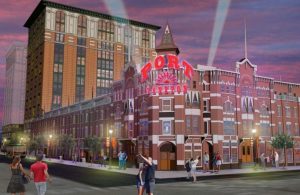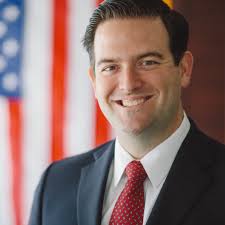Boxing promoter Bob Arum has drunk deeply of the NFL-in-Vegas Kool-Aid, telling the Wall Street Journal, “Say [the Raiders] play the Giants. It’s going to bring 20,000 people coming from New York to watch the game, clutching fistfuls of money … it’s going to  be like eight New Year’s Eves in town.” Yeah, right. And holding the NBA All-Star Game in Las Vegas was a good idea. (That’s a mistake unlikely to be repeated.) Las Vegan Brent Musberger seems to have a firmer grasp on reality, saying, “In the long haul, you have to be able to market this team within the community,” something owner Mark Davis has done a poor job of. In Musberger’s view, the NFL’s concerns about gambling are exaggerated and the league benefits from sports betting: “The NFL would not be as big as it is today without people taking a chance on their games.”
be like eight New Year’s Eves in town.” Yeah, right. And holding the NBA All-Star Game in Las Vegas was a good idea. (That’s a mistake unlikely to be repeated.) Las Vegan Brent Musberger seems to have a firmer grasp on reality, saying, “In the long haul, you have to be able to market this team within the community,” something owner Mark Davis has done a poor job of. In Musberger’s view, the NFL’s concerns about gambling are exaggerated and the league benefits from sports betting: “The NFL would not be as big as it is today without people taking a chance on their games.”
Commissioner Roger Goodell continues to wrap himself in the mantle of sanctimony, proclaiming, “We’re not changing our position as it relates to legalized sports gambling. We still don’t think it’s a positive thing.” Yeah, that must be why Goodell is so eager to establish footholds in Great Britain and other countries where sports betting is not only legal but rampant. We know who’s fooling who here. Not Westgate Las Vegas Sportsbook Director Jay Kornegay, who anticipates a betting bonanza, saying, “We did see Raider Nation in full force this past year. They were so good. We do expect that extra spike with the Raiders now that they’re our team. A lot of people around here are very excited.”
* Frank Fantini has some interesting prognostications about the steeplechase to get a casino concession in Japan. Not least of these are that Las Vegas Sands may be a long shot and that Boyd Gaming could be a dark-horse contender. Also, smaller cities, tired of them that has gets (and badly in need of economic stimulus), might make a big noise to be considered ahead of Osaka and Yokohama, the presumed front-runner sites.
* When the gambling bug bites you in South Dakota, your options may soon extend beyond Deadwood. Politicians in Yankton want to create a casino that would tie the downtown area in with the waterfront.  Boosters are looking beyond Deadwood, though, as their competition. “I think the challenge is we need to compete with Omaha, Lincoln and Minneapolis,” said state Sen. Bernie Hunhoff. Casino companies need not apply for the $35 million-$50 million Gurney Building concession. The larger scheme is to place the “entertainment center” in the hands of a nonprofit, whose gaming proceeds would be rolled into quality-of-life improvements for Yankton. That’s a nice plan but it has to be approved by South Dakota voters first, so Yankton is still a ways from counting the money.
Boosters are looking beyond Deadwood, though, as their competition. “I think the challenge is we need to compete with Omaha, Lincoln and Minneapolis,” said state Sen. Bernie Hunhoff. Casino companies need not apply for the $35 million-$50 million Gurney Building concession. The larger scheme is to place the “entertainment center” in the hands of a nonprofit, whose gaming proceeds would be rolled into quality-of-life improvements for Yankton. That’s a nice plan but it has to be approved by South Dakota voters first, so Yankton is still a ways from counting the money.
* Leapfrogging the Pacific Ocean, skill-based-slots developer GameCo is opening an office in Macao. Given the relative immaturity of the Macanese market, it’s slightly surprising that it already needs a SBS rejuvenation. Casino operators over there have expressed interest in the product, though none have publicly committed as yet. You have to hand it to GameCo CEO Blaine Graboyes: He doesn’t let any grass grow under his feet.
* The tortured relationship between the Seminole Tribe and Florida‘s government took another twist this week, although the tribe and the Lege seem to be on the same page: against the judiciary branch. A Leon County judge ruled that gray-market machines that resemble slots were permissible. Judge John Cooper held that because of a preview feature on the machines that showed the game outcome beforehand, the machines weren’t slots as “skill is not utilized in the game because there is nothing a player can do to change the outcome.”
Florida’s Department of Business & Professional Regulation has been trying to crack down on the machines, made by Blue Sky Version 67 and distributed by Gator Coin II. Thanks to Cooper’s ruling, say the Seminoles, “thousands of additional games are likely  to be added in the near future.” While the two houses of the Legislature grapple with wildly varying version of gaming reform, the Seminoles want them to explicitly outlaw the devices. They may not need to do much persuasion. Tribal liaison and state Rep. Jose Felix Diaz (R) said, “This is definitely a game-changer. It puts us now in a position where we have to fix it or we’ll be left with a whole lot less money in our budget.” Indeed. If the Seminole compact is abrogated, Florida has to find $250 million right quick.
to be added in the near future.” While the two houses of the Legislature grapple with wildly varying version of gaming reform, the Seminoles want them to explicitly outlaw the devices. They may not need to do much persuasion. Tribal liaison and state Rep. Jose Felix Diaz (R) said, “This is definitely a game-changer. It puts us now in a position where we have to fix it or we’ll be left with a whole lot less money in our budget.” Indeed. If the Seminole compact is abrogated, Florida has to find $250 million right quick.

